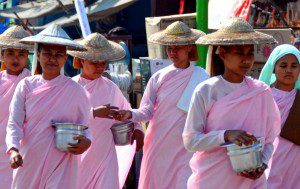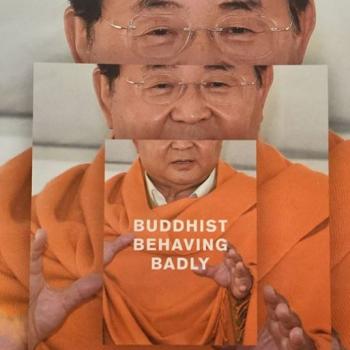Volumes have been written over the past few decades on Buddhism and Feminism, much of it by feminists in the West pushing Buddhism to live up to its egalitarian values in opposition to its often chauvinistic institutions. See below for a short list of recommended books.
The work of Buddhist feminists, which should be all of us, still has a long way to go. But anyone who thinks that this is a wholly new development has some catching up to do. The Buddha did create the world’s first female monastic order. And while he made them ‘under’ the men, I support arguments that this was for pragmatic purposes. In a sense he was a radical, ordaining women, but he was also well aware of the need to fit somewhat within the social structures of his day. A cooperative relationship with the laity, while pushing them toward greater generosity, mindfulness, and so on, was a must in order for his ‘middle way’ to be successful in the world.
Today, of course, much of the world has changed. Women still face unfair challenges, but we’ve come a long way. And even in the time of the Buddha it was acknowledged that women were absolutely equal in ability to attain awakening (if there were hindrances, they were socially constructed, and not inherent in gender).
A wonderful little “Poem by an Elder Nun” (Therigatha) helps us see some early feminism in action. Other poetry in the Therigatha is certainly amongst the most endearing and human of all the poetry I have ever read. In all humility, I think it needs a better translator than Thanissaro Bhikkhu, let alone myself. But with proper translation, I would expect these poems to rise quite near the level of Neruda or Rumi.
So here goes. A poem simply titled, “The Poem of the Elder Nun, ‘Free'”.
So free, I’m so wonderfully free! From three lowly things I’m freed:
From mortar and pestle, and lowly husband
Free from birth & death, having removed the support of becoming.
— The Elder Nun, “Free”
11. Muttātherīgāthā
SUGGESTED READING:
Buddhism After Patriarchy: A Feminist History, Analysis, and Reconstruction of Buddhism – Rita M. Gross
Meeting the Great Bliss Queen: Buddhists, Feminists, and the Art of the Self – Anne C. Klein
Prolife, Prochoice: Buddhism and Reproductive Ethics.: An article from: Feminism & Nonviolence Studies – Karma Lekshe Tsomo
Religious Feminism and the Future of the Planet: A Christian-Buddhist Conversation – Rita M. Gross, Rosemary Radford Ruether
Buddhism, Sexuality, and Gender – Jose Ignacio Cabezon (Editor). My undergrad advisor has an article in this on early Buddhism and Women that has been very influential.












